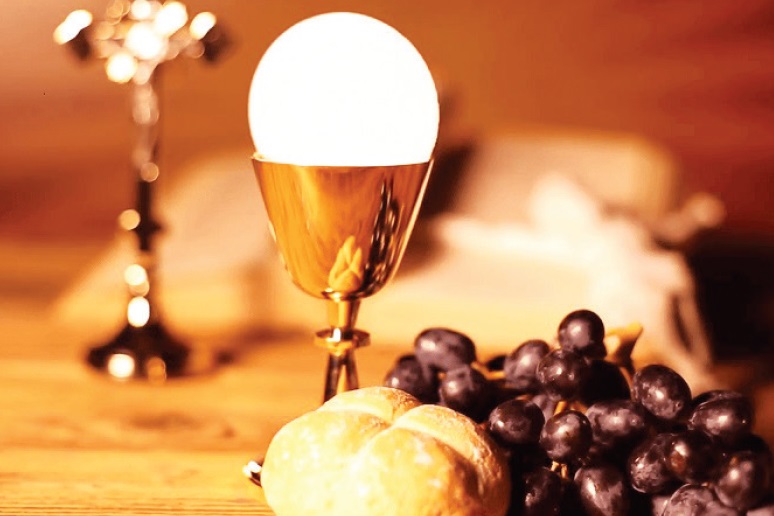The living Word becomes the Eucharist
We all know very well that the Eucharist celebration comprises of two major parts, the Liturgy of the Word and Liturgy of the Eucharist.
Jun 17, 2022

Reflecting on our Sunday Readings with Fr Joe Matthews OFM Cap
The Body and Blood of Christ (C)
Readings: Genesis 14:18-20;
1 Corinthians 11:23-26;
Gospel: Luke 9:11-17
Since an adolescent, I remember this line very vividly “I will take up the cup of blessing and call upon the Lord’s name.” and it became a reality when I was ordained a priest. On this feast of the Body and Blood of Christ, I would like to share how we can live out or participate in this mystery that we celebrate, as St Paul says “The cup of blessing that we bless is it not a participation in the blood of Christ? The bread that we break is it not a participation in the Body of Christ?”
We all know very well that the Eucharist celebration comprises of two major parts, the Liturgy of the Word and Liturgy of the Eucharist. Preaching does not depend on the skill of oratory but on the gift of the Spirit. It is an experience of God’s Word in the heart of the priest, the Word made flesh in his life, that he has heard, seen, touched and tasted, that he communicates to your heart that you may have eternal life and your joy be complete.
At this juncture, it is important to understand that there are three layers of meaning in the Word of God. First, you have the historical layer that happened in space and time. Second, the theological layer that indicates how God uses a historical event to save his people. The third is the mystical layer – what God is telling me right now and how I should respond so that the Word can become flesh in my life.
How do we listen to the Word of God? If I come to church with a fixed mindset or certain assumptions, for example, the father’s homily is boring or too long, he is struggling to express himself, he speaks through his nose even my little boy can imitate him, the visiting priest gives a better homily than the parish priest, I already know what he is going to preach, it is the same every week, or today he made some sense in his homily.
This is not the way to listen to the Word of God. Because you are there sitting like teachers and giving marks for his preaching. What are you doing is you are analysing, correcting, commenting, judging, or enjoying his homily.
You hear the priest speaking with your ears and his voice is amplified by the microphone but God speaks to your heart in silence. When you have the attitude of prophet Samuel “Speak, Lord your servant is listening”, your heart will experience joy and love as the Word takes flesh in you and you will know what to do next.
The Living Word then becomes the Body and Blood in the Eucharist offering and sacrifice. What are we offering? Before Jesus can take, bless, break and give it back to you. As a priestly people, we join Jesus Christ in offering ourselves through bread and wine which represents the work of our hands and all that we are. But let me unpack this loaded statement for you.
First, Jesus is offering His broken body to His heavenly Father. Do we offer our ailing and hurting body? Is your body swollen and painful and your organs dysfunctional? Give all these to Me, Jesus says. I will raise your broken body together with My broken body to My heavenly Father.
Second, Jesus is offering His agony to His Father, for He said “My soul is sorrowful unto death”.
What is distressing your mind? What are you sad about? Why all that anxiety, sadness and anger? Give it to Me I will raise it up together with My agony to My Heavenly Father.
Again, Jesus is offering the sins of humankind to His Father. What is the sin you are conscious of? The urge to lust etc. Offer all your sinful addictions and powers that are holding you captive and destroying your family, give it all to Me. The wages of sin is death. Jesus came to take upon Himself our sins. He is the one who paid the price for our sins with His blood. As that one sacrifice on mount Calvary is made present on the altar at the hands of the priest, let us offer our sickness, pains and sins together with the bread and the wine. Everything that is offered in the hands of the Lord is accepted into His heart, is anointed by the Holy Spirit and is transformed. This is what happens at consecration. Jesus speaks in the voice of the priest, this is My body broken for you, this is My blood shed for you. His life-giving words, then and there become living flesh and blood on the altar. In theology we call it transubstantiation.
The question is — what did you offer? All that we offer also changes in substance. The measure we offer is the measure we will receive. Sadness becomes joy, anger becomes gentleness, I am also strengthened by grace to say No to my addictions and experience spiritual healing and peace. My total self is indeed transformed and all that I offered comes back to me in Holy Communion, where the Lord comes to consume me into His divine love and enables me to live this mystery of the Eucharist as a priest, victim and the altar of sacrifice for the salvation of the world. God bless.
(Fr Joe Matthews OFM Cap is a priest from the Diocese of Malacca Johore.)







Total Comments:1